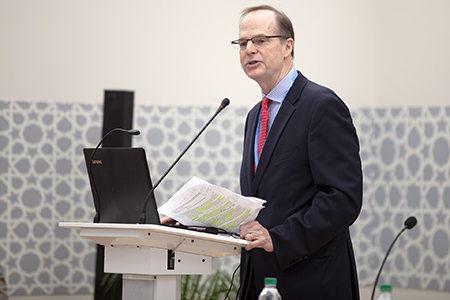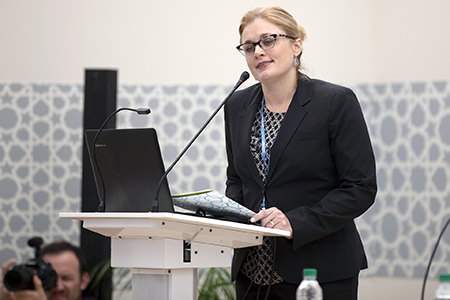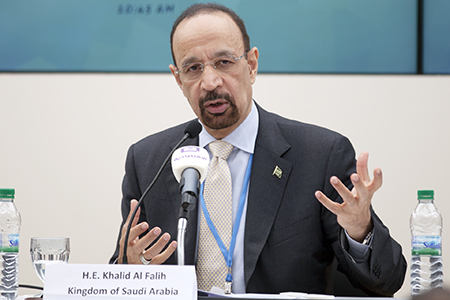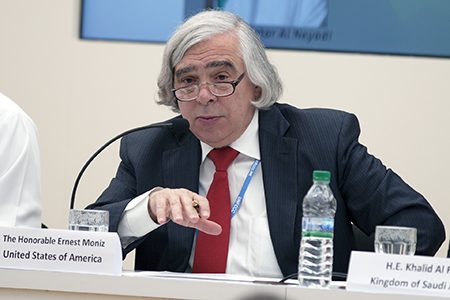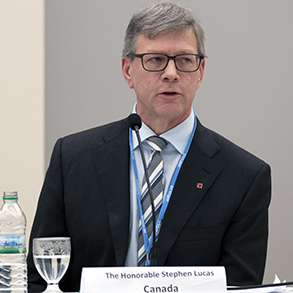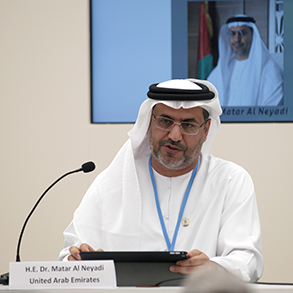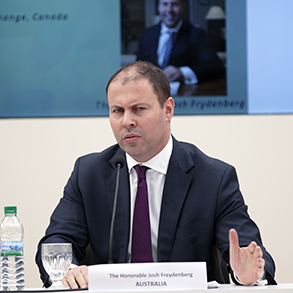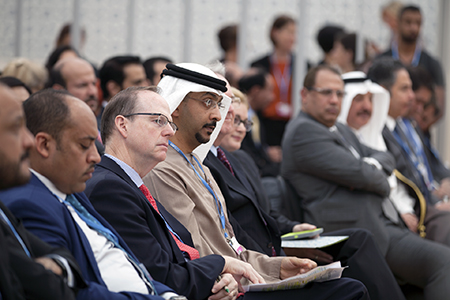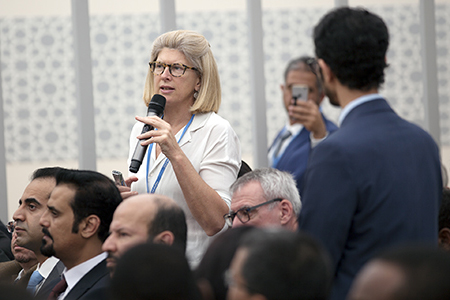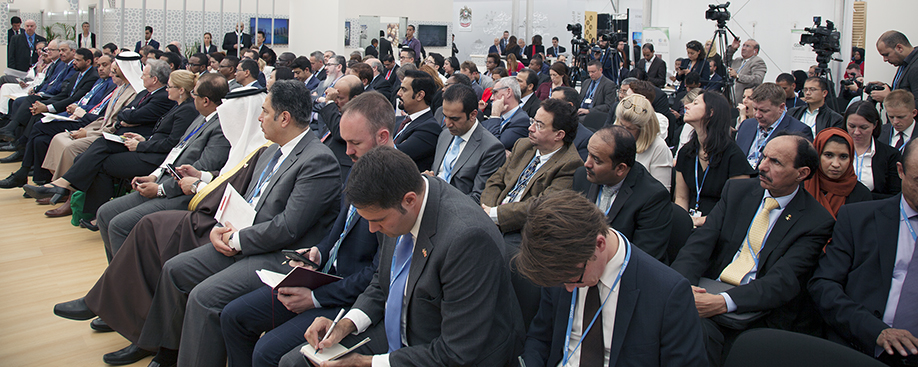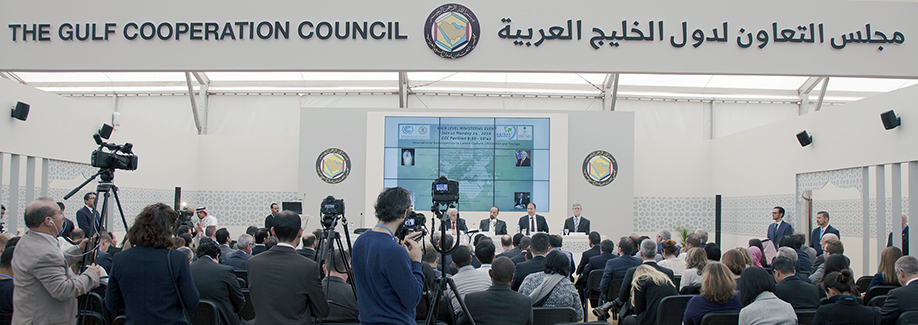Summary
IISD Reporting Services has provided coverage of selected GCC Pavilion events at the Marrakech Climate Change Conference, including written, digital and video coverage.
The following event was covered on Monday, 14 November 2016:
Photos by IISD/ENB | Mike Muzurakis
For photo reprint permissions, please follow instructions at our Attribution Regulations for Meeting Photo Usage Page.
International Developments in Carbon Capture, Utilization and Storage (CCUS)Presented by the Government of Saudi Arabia and the US Department of Department of Energy
This session was opened by Khalid Abuleif, Chief Climate Change Negotiator, Ministry of Energy, Industry and Mineral Resources, Saudi Arabia, and was co-moderated by Arafat Al Yafei, CEO, Abu Dhabi Carbon Capture and Storage (CCS) Company, and Sarah Forbes, Department of Energy, US.
Setting the scene, Paul Simons, Deputy Executive Director, International Energy Agency (IEA), highlighted that: CCS is not optional in terms of delivering the Paris Agreement, stressing that bioenergy with CCS will be important going forward; significant progress has been made in the sector, emphasizing the importance of international collaboration in furthering this technology; despite the progress, CCS deployment is not on track and will need to be scaled up in order to meet targets by 2025; and targeted policy support is essential.
Opening the panel discussion and noting that this was his first Conference of the Parties (COP), Khalid Al Falih, Minister of Energy, Industry and Mineral Resources, Saudi Arabia, noted that everyone believes that fossil fuels will be with us for a long time to come, but that there is need for investment in renewable energy solutions, with a key tool being CCUS. He stressed that without CCUS, it will not be possible to make the long-term energy transition to address carbon emissions; and called for policymakers to commit to creating the space for CCUS investments.
Reiterating the need for international collaboration on CCS, Ernest Moniz, Secretary of Energy, US, noted that to achieve deep decarbonization, CCS will need to play a bigger role, particularly in the industrial sector. He said that while CCS will be important to address emissions in the electricity sector, the focus must be expanded to other sectors as the electricity sector already has other renewables as options. He highlighted that the world needs to discover new innovative ways of carbon utilization, and stressed the need for a science-based regulatory approach in order to achieve the scale of carbon storage necessary to meet the Paris Agreement commitments.
Josh Frydenberg, Minister of Energy and Environment, Australia, stressed that CCUS discussions are important from the environmental, economic and political perspectives, noting that the transition to a low-emissions future has put pressure on governments to make CCS economically viable. He noted that Australia has spent over US$500 million on CCS innovation, saying that some of this financing has come from the public sector, while a significant amount is from the private sector.
Matar Al Neyadi, Ministry of Energy, United Arab Emirates (UAE), highlighted the UAE’s initiatives on CCUS, noting a joint venture project with Saudi Arabia, which, he noted, will be an important step in incentivizing further investment in CCS. He noted that the project will aid in oil recovery, and underscored the UAE’s commitment to climate action and responsible energy production.
Stephen Lucas, Ministry of Environment and Climate Change, Canada, noted that the world is currently learning from the large-scale CCUS operational facilities, and stressed the utility of CCS in meeting national and local emissions reduction goals. He drew attention to a joint US-Canada CCSU endeavor in Ottawa, pointing to research and development as critical to driving down the cost of the technology, and highlighting that the national government is working with local authorities on this issue.
In the ensuing discussion, participants considered the role of the US in furthering CCUS under the new administration; trade retaliation to counter the US pulling out of the Paris Agreement; the need for CO2 transport and storage networks; and the viability of incentives for CCUS deployment to stimulate the market and drive down costs.
Paul Simons, Deputy Executive Director, IEA, noted that IEA has been at the forefront of CCS deployment for 25 years, and stressed that CCS will continue to play an important role as countries strive to meet their Paris Agreement commitments.
Sarah Forbes, Department of Energy, US
Khalid Al Falih, Minister of Energy, Industry and Mineral Resources, Saudi Arabia, advocated for policy parity for all clean energy solutions, calling for acknowledging that CCS is as competitive as other renewable energy solutions and could contribute 1/6th of emission reductions between 2015-2050.
On national level action, Ernest Moniz, Secretary of Energy, US, pointed to the opening of three capture facilities in his country that are using innovative technology to bring down the cost of CCS.
Stephen Lucas, Ministry of Environment and Climate Change, Canada, stressed the critical need for partnerships in CCUS to meet commitments within the Paris Agreement.
Matar Al Neyadi, Ministry of Energy, UAE
Josh Frydenberg, Minister of Energy and Environment, Australia, stressed that while the CCS costs are coming down, more work needs to be done to get the costs down to be able to compete with wind and solar power.
Arafat Al Yafei, CEO, Abu Dhabi CCS Company
A participant asks a question to the panel.
Participants listen to panelists.
A view of the room during the event
Contact:
- Sarah Forbes (Moderator)
| Sarah.Forbes@hq.doe.gov

